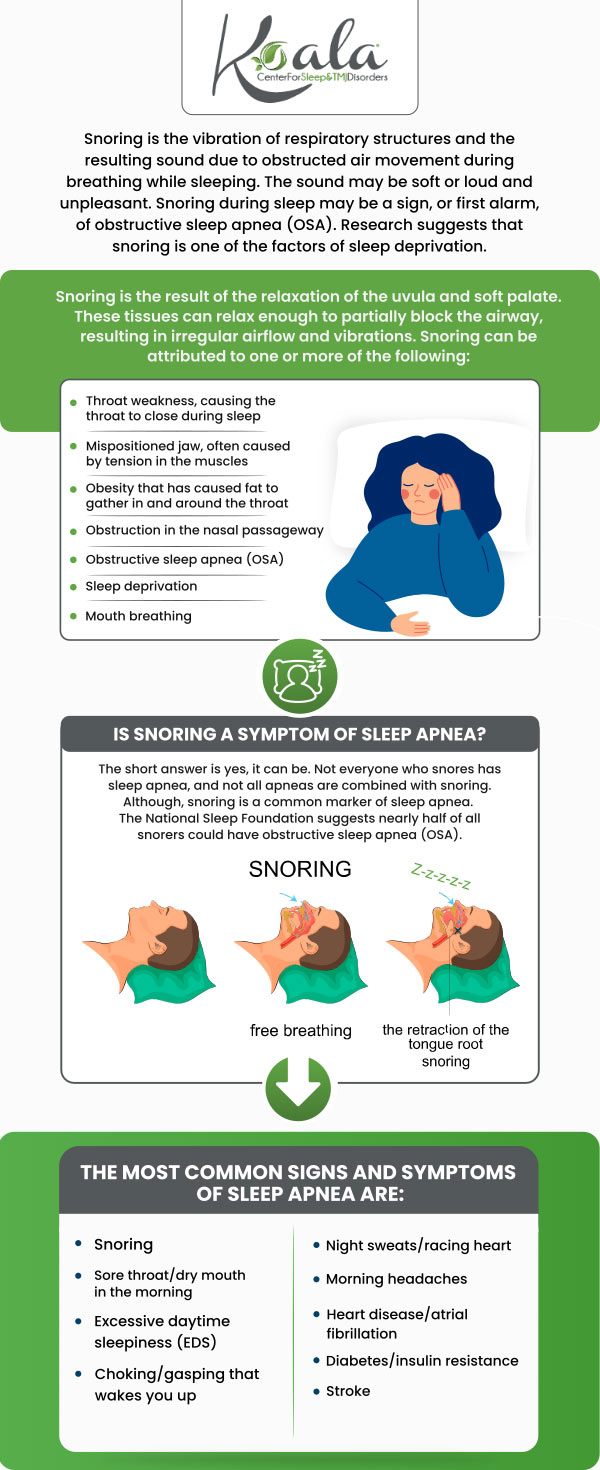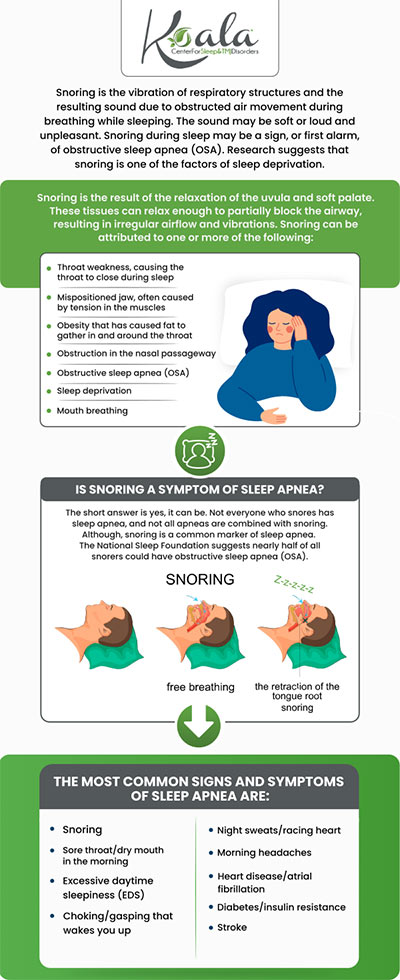What Sleep Stage Do You Snore In?
Treatments are available for snoring! Call our dedicated sleep team today at Koala® Center For Sleep & TMJ Disorders or visit us online to book an appointment. We have convenient locations across the U.S. in Bloomington IL, Peoria/Dunlap IL, El Paso TX and Wausau WI.


Table of Content:
Why does snoring not wake up the snorer?
What sleep stage do you snore in?
Is snoring caused by the nose or throat?
What kind of doctor do you go to for snoring?
When sleeping, our ears still hear the sounds around us, those caused by us, and transmit these messages to the brain. However, even when you are asleep, your brain is still filtering through your senses to detect sounds of high priority that signal danger. For example, a snorer does not wake up from their snoring for the same reason they do not wake up to footsteps; these sounds are often heard and do not signal danger or a need to wake up. That said, sleep studies show that many loud snorers have multiple microarousals throughout the night, in which they are partially awakened by their sounds but go back to sleep and won’t likely remember it in the morning.
There are four sleep stages: N1, N2, N3 (also known as slow-wave sleep or deep sleep), and rapid eye movement (REM). The first stage of sleep generally only lasts five seconds or less as you begin to fall asleep. The N2 stage may occur for up to an hour, lengthening with each new cycle; the body starts to relax the muscles in this stage and prepares for deep sleep. Opposingly, N3 shortens with each new cycle, typically lasting twenty to forty minutes. The muscles are most relaxed around this time, and as a result is when most snoring occurs. In REM, your body goes through atonia, temporary paralysis of the muscles. Worsened heavy snoring in REM is most seen in patients with obstructive sleep apnea.
Snoring is caused by obstructed or reduced airflow through passageways and may occur in four places: the nose, the mouth, the pharynx, and the throat. In the nose, a deviated septum or unusually small nostrils may cause snoring, and it will sound like high-pitched whistling or brief grunts. Allergies and colds that cause sinus congestion can also cause nose-based snoring. Snoring may also be mouth-based and is differentiated from nose snoring as it only occurs when the mouth is open. In the mouth, the posterior (toward the back) roof, called the soft palate, moves up and down as we breathe and speak. This structure is found between the back of the nasal cavity and oral cavity and can obstruct airflow through these areas to the lungs. When the body relaxes in a deep sleep, this soft palate may drop and result in mouth-based snoring. The pharynx, a portion of the body at the back of the throat and nose, is a transitional area where food, air, and other substances move to the stomach via the esophageal tube or to the lungs through the trachea. The pharynx is divided into three areas, the nasopharynx (the back of the nasal cavity), the oropharynx (the back of the mouth and throat), and the laryngopharynx (the beginning of the airway passage to the lung). The tongue is a large muscle that reaches back into the oropharynx, and can cause snoring, considered “tongue-based.” The body’s muscle activity declines during deep sleep, and muscles like the tongue relax. Patients with this are known to snore when on their back and are likely doing so due to the relaxed tongue obstructing the throat and making breathing difficult. Lastly, snoring may occur in the throat, as the relaxation and collapse of the muscular airways can also block breathing. This type of snoring is seen in patients experiencing obstructive sleep apnea (OSA) and is considered the most dangerous as it leads to dips in oxygen concentration in the blood.
Though a primary doctor can handle concerns pertaining to snoring, an otolaryngologist or somnologist may be referred for specialized tests and treatment. For example, an otolaryngologist, also known as an ear, nose, and throat (ENT) doctor, may be able to diagnose conditions or obstructions that are physically causing the snoring. Alternatively, somnologists, or doctors specializing in sleep-related disorders, could conduct a sleep study to pinpoint the cause. In a sleep study, various body functions, including brain activity and blood oxygen levels, are monitored to determine when and why your snoring occurs.
If you are experiencing snoring and would like to learn more information, our dedicated sleep team at Koala® Center For Sleep & TMJ Disorders can help. We are eager to hear from you, so please do not hesitate to make an appointment, online or by phone, to meet with one of our exceptional doctors.

Additional Services You May Need
▸ KoalaKIDZzz®
▸ Sleep Apnea
▸ Snoring
▸ TMJ Disorder
▸ Fatigue
▸ Sleep Disorders
▸ Weight Loss
▸ CPAP Alternative
▸ Oral Appliances




